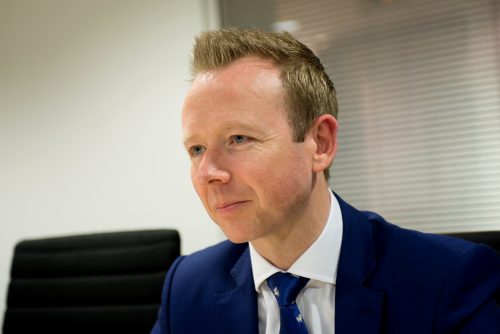Brexit plea to Government: Do the right thing for UK plc

With the meanginful vote on the UK’s exit from the EU looming tomorrow (January 15), tensions are rising over the possible implications for businesses, and education, across the North West.
Little clarity is emerging as the crunch vote nears and political horse trading continues, but with so much at stake, for companies, education and working people throughout the region, a call has gone out from those at the ‘coal face’ of commerce.
Leaders of businesses and academic institutions from around the region have called on the Government to consider the consequences of a botched deal, or a no deal, and the impact it could have.
Wayne Nash, head of law firm Shoosmiths in Manchester, said: “While there are sector-specific issues to take into consideration, the biggest impact for businesses generally is likely to be around general confidence in the market place.
“We have been assisting clients with their Brexit preparations and the approach varies from business to business.
“Most clients have undertaken some form of risk analysis, some have gone as far as implementing contingency plans and making alterations to their business models, but equally, some have decided not to take any steps until they know whether the draft withdrawal agreement is approved or if we face a ‘no deal’ exit.
“It comes back to the lack of certainty impeding planning, and businesses remain exposed the longer this uncertainty continues.
“My observation is that businesses, understandably, and like never before, are keeping an ear very close to the ground, staying close to their customers and suppliers, and counting down the days until we can all begin to move forward with some certainty.”
Mark Street-Docherty, chief executive of Manchester-based genetic testing company Elucigene Diagnostics, said: “Regardless of the sideshow surrounding the three-day amendment, the fact Theresa May must come back to Parliament with revised proposals quickly, should her plan be rejected, is welcome news.

Mark Street-Docherty
“There’s already been far too much political brinksmanship and unhelpful delay.
“Forward-thinking internationally trading companies, however, haven’t had the time to be distracted by it.
“Despite trading in more than 50 countries globally, Europe remains key to us. We have a number of assays due for release across Europe in 2019, with the first of these to be launched in France in the second half of the year.”
“Likeminded pragmatic UK-headquartered firms in the medical device and diagnostics industry have been looking at how quickly they could establish a European operation, to run alongside their domestic business for months now.
“For those which rely on self-declared CE Marking, as is the case for currently around 85% of in vitro diagnostic companies, leaving without a deal may pose serious challenges to business continuity for those which haven’t prepared properly.”
Carl Williams, managing partner of business advisors Grant Thornton in the North West, warned that businesses need to prepare for even further deadlock and delays: “The vote in Parliament may not provide any further clarity for businesses.
“Business should not wait for the politicians to reach an agreement. It could be February, or even March, before this political deadlock breaks. By then it will be too late to make contingency plans for 29 March.

Carl Williams
“The North West has many high growth, innovative businesses that are inextricably linked to Europe and global markets.
“As a country we face greater political volatility than any time in the last 40 years. Businesses should keep calm, carry on and be ready for change.
“We know from our own research in Grant Thornton’s International Business Report that around 78% of businesses have done some planning for Brexit – and the majority of those who have plans are factoring in a ‘No Deal’ scenario.
“As the UK Government itself steps up its ‘No Deal’ contingency planning, businesses would obviously be very wise to plan for the worst, whilst still hoping for the best.
“In fact, we found that those businesses that are actively planning are much more confident about their outlook, with clarity on where Brexit impacts them and where it doesn’t.
“Many of those taking a more pragmatic approach are then moving on to focus on medium-term plans, redesigning their operating models to mitigate costs and support growth.
“They are even looking at their competitors’ exposures to assess relative advantages and scope for M&A opportunities in a more turbulent market.”
He said: “Business continuity plans for a No Deal Brexit (as the most immediate and most disruptive scenario) are about looking for opportunities that this may create, and getting match-fit, focusing on business basics like cashflow, retaining and attracting talent, sweating your assets to meet customer need, and removing unnecessary costs.”
Dr Annette Bramley is a director of the N8 Research Partnership, a partnership created in 2007 of the eight research-intensive universities in Northern England – Durham, Lancaster, Leeds, Liverpool, Manchester, Newcastle, Sheffield and York,
She said: “A no-deal Brexit could be one of the biggest challenges ever faced by the university sector.
“Our country’s higher education sector contributes hugely to our prosperity through research, innovation and education.

Dr Annette Bramley
“Our universities act as anchor institutions, generating jobs and opportunities and supporting their local communities and schools.
“A thriving higher education sector will be a vital component of Northern and national success post-Brexit. This sector depends on recruiting internationally in a global market for talent; to continue to thrive we need to ensure that international students and researchers continue to see the UK as an attractive and welcoming place to begin and build their careers.
“Their experiences here shape their perspectives, attitudes and views for years to come.
“Already, numbers of postgraduate research students from outside of the UK enrolling at our institutions are falling. Without cast-iron assurances from government over future research funding world-leading academics and researchers may leave for countries where access to European Research Council (ERC) funding is not at risk.”
She added: “The UK punches well above its weight in securing research grants from Europe.
“These have made possible world-leading research in our universities – at the forefront of scientific and medical breakthroughs.
“Government has set an ambitious target of 2.4% GDP to be invested in research and innovation by 2027. Ensuring that our regional universities and businesses are able to access support equivalent to the 1.3bn euros of EU funding which has not yet been guaranteed by the Government will be essential to achieve this target and to protect both our reputation for excellence, and thousands of livelihoods.”
Henry Brooks, founder and managing director of Tatton Group, the Cheshire-based property business, said: “We need assurances that funding to support businesses will not only be maintained and focus on regional needs, such as productivity, innovation and international trade, but will also be easy to access and reflect local needs.

Henry Brooks
“Securing a meaningful replacement for EU funding is key to maintain and stimulate business growth across the North West and to help keep us on the map.
“For example, our Cheshire Advanced Manufacturing centre, a joint project with Manchester Metropolitan University, relies on such funding to deliver state-of-the-art 3D printing equipment to assist businesses on their innovation journey and, in turn, help the region prosper.
“It is, therefore, vital that we have a clear, efficient and effective system for local access and decision making so businesses feel confident about investing in their futures – ultimately delivering the promise of devolution and Industrial Strategies.”




